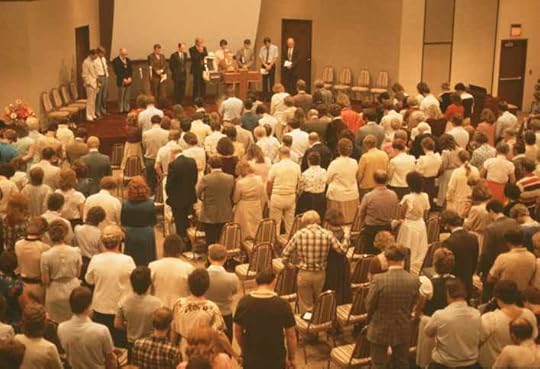Randy Alcorn's Blog, page 125
November 29, 2017
Light Has Dawned: Reflections at Christmastime on the Light of Jesus

One day I got a late start on a bike ride and went too far. By the time I turned around, I found myself miles from home on a trail with absolutely no light. At times I could not see the trail’s edge, and I had no clue what was on either side.
I was in the dark. Alone. Or at least I thought so, until I felt a presence and realized I’d just passed someone within inches. I could easily have run into him or her. I don’t remember being afraid of the dark until that night. I had no light and couldn’t flip a switch or call someone to solve my problem. When I finally made it to the dim lights of civilization, I was flooded with relief...and sheer happiness!
The people Jesus spoke to lived without streetlights. If they didn’t have a lamp and a means to light it, they groped in darkness, vulnerable to assailants. They understood what it meant when Jesus said, “I am the light of the world. Whoever follows me will not walk in darkness, but will have the light of life” (John 8:12).
Jesus didn’t say, “I’ll point you to the light” or “I’ll give you the light.” He said, “I am the light.” The only Light.
John tells us in his Gospel that Jesus is “the true light that gives light to everyone” and the light that “shines in the darkness, but the darkness has not overcome it” (John 1:9, 5). I love that phrase from John 1:9, which says that Jesus came as the light that “enlightens every man” (NASB). I think it reflects the fact that all people in history have benefited from the coming of Christ, and His redemptive life and death—even those who reject Him. “The people dwelling in darkness have seen a great light, and for those dwelling in the region and shadow of death, on them a light has dawned” (Matthew 4:16).
God is portrayed in Scripture as full of light. He has a bright radiance, seen by Moses and Elijah and Isaiah and the apostle John. During Christ’s transfiguration, the appearance of His face changed, and His clothing “became as bright as a flash of lightning” (Luke 9:29, NIV). He appeared to Paul and blinded him on the road to Damascus (Acts 9:3-9). The apostle John is emphatic: “God is light; in him there is no darkness at all” (1 John 1:5).
Scripture says that God Himself will be the light source for the New Jerusalem. Isaiah tells us, “The Lord will be your everlasting light” (60:19), and “Nations will come to your light, and kings to the brightness of your dawn” (Isaiah 60:3, NIV). But John goes further, saying, “The Lamb is its lamp” (Revelation 21:23, NIV). He saw what Isaiah couldn’t: The God who is the city’s light is the Messiah Himself.
This present world is still cursed with sin and suffering, but these obstacles can’t trump joy or diminish the light that dawned at Christ’s incarnation. He has already come, and with Him came light, hope, and redemption—the down payment of this world’s final transformation, when we'll experience His brightness firsthand.
Photo by George Hiles on Unsplash
November 27, 2017
Reflections on 40 Years of God’s Faithfulness to My Home Church, and Why the Local Church Matters
This year marks the 40th anniversary of the founding of my home church, Good Shepherd Community Church in Boring, Oregon. When the church started, I was a full-time pastor at the ripe old age of 22!
I’d like to share some memories from the past four decades, tying them together with thoughts about the value and importance of local churches.
Here’s a video made several months ago, not only celebrating our anniversary, but also looking forward to what lies ahead for our church. I’ll follow it with some reflections.
The Brink of Something Great
 I became a Christian as a teenager, and by the time I’d known the Lord two years I knew I wanted to go to Bible college and study God’s Word. At first, I wanted to be a missionary, but God had other plans. I was 22 and Stu Weber, my youth pastor at the church where I came to Christ, was 31 when we were asked to participate in a Bible Study of forty people who met in the basement of Dottie and Norm Norquist’s home in Gresham, Oregon. As I share in the video, that study soon became something much more, and Stu and I were asked to be the pastors of a brand new church. (After all these years we remain good friends!)
I became a Christian as a teenager, and by the time I’d known the Lord two years I knew I wanted to go to Bible college and study God’s Word. At first, I wanted to be a missionary, but God had other plans. I was 22 and Stu Weber, my youth pastor at the church where I came to Christ, was 31 when we were asked to participate in a Bible Study of forty people who met in the basement of Dottie and Norm Norquist’s home in Gresham, Oregon. As I share in the video, that study soon became something much more, and Stu and I were asked to be the pastors of a brand new church. (After all these years we remain good friends!)
A few weeks later we took nominations for the church name, and I typed up the serious ones, weaving in a few others, including First Apostolic Fire-Baptized Church of Gresham, and Boring Bible Church. (Believe it or not—the local ministerial group was once called The Boring Pastors’ Fellowship.) We voted, and Good Shepherd Community Church won easily. (I recall Cathy Anderson asking, “Is that name too long to fit on a check?”) We hoped “Good Shepherd” would reflect the centrality of Christ, as demonstrated in John 10, as well as the unity of the flock and the fact that all of us—including the pastors, the undershepherds—are sheep.
 Garland Gabbert, a godly man who later became one of our first elders, stood up at one of those early meetings and with tears gave an impassioned plea that we wouldn’t be a denominational church, but that we’d just follow the guidelines of Scripture. (I always tried to sit near Garland, hoping his wisdom and humility would rub off on me.)
Garland Gabbert, a godly man who later became one of our first elders, stood up at one of those early meetings and with tears gave an impassioned plea that we wouldn’t be a denominational church, but that we’d just follow the guidelines of Scripture. (I always tried to sit near Garland, hoping his wisdom and humility would rub off on me.)
I remember both tears and laughter from those early days. It wasn’t always easy, because Good Shepherd was born out of difficulty—many of us were leaving another church we dearly loved. But there was also awe and wonder, because we knew we were on the brink of something great, something God was doing.
Our first official service was held on May 1, 1977 at the musty old Orient Grange Hall. Norm Norquist led hymns, I read a written prayer of dedication for this new church, and Stu preached an excellent message on Yahweh, God’s name, tying into Isaiah 6 and God’s holiness.
 We had an evening service that day, and I preached on “The Church: Receptacle of God’s Glory,” based on 1 Corinthians 3:16-17, which says, “Don’t you know that you yourselves are God’s temple and that God’s Spirit dwells in your midst? If anyone destroys God’s temple, God will destroy that person; for God’s temple is sacred, and you together are that temple.” The distinctive of this passage is that “you yourselves” is plural, while “God’s temple” is singular. This is different than the reference three chapters later which speaks of all individual believers having bodies that are temples of the Holy Spirit (1 Corinthians 6:19). So, yes, we are each the dwelling place of God as individuals but in a very beautiful sense, as we assemble together as a church, we are corporately the dwelling place of God’s Spirit.
We had an evening service that day, and I preached on “The Church: Receptacle of God’s Glory,” based on 1 Corinthians 3:16-17, which says, “Don’t you know that you yourselves are God’s temple and that God’s Spirit dwells in your midst? If anyone destroys God’s temple, God will destroy that person; for God’s temple is sacred, and you together are that temple.” The distinctive of this passage is that “you yourselves” is plural, while “God’s temple” is singular. This is different than the reference three chapters later which speaks of all individual believers having bodies that are temples of the Holy Spirit (1 Corinthians 6:19). So, yes, we are each the dwelling place of God as individuals but in a very beautiful sense, as we assemble together as a church, we are corporately the dwelling place of God’s Spirit.
I talked about how God indwells us, and how if the world is going to see Jesus, we have to show them what He’s like. That’s what we wanted our church to be all about. I asked my friend Steve Duncan to play his guitar and sing John Fischer’s song “We are the Holy of Holies.” Here’s a blast from the past, John Fischer singing that song.
I’ll never forget the feelings of excitement we had that first day as a church. People just didn’t want to go home. It felt like the first spring day after a long winter. (Here’s a video that our new lead pastor Bob Bryant, Stu, and I recently filmed at the Grange Hall, talking about those early days.)
Sorrow, Joy, and Growth
 Our first real crisis, and ultimately our first death, came when Marion Smith, a quiet and insightful middle-aged man in our group, got cancer. In our first 25 years of existence, I think there was no single event that had more impact on our church than Marion’s death. It drew us together, and taught us that God’s ways are above our ways. He’s not our follower; we’re His followers. It’s not about us, it’s about Him. We’re not the point, He’s the point. It reminded us that this world, as it is now, is not our home. All of us only have a short time here—so let’s use it well.
Our first real crisis, and ultimately our first death, came when Marion Smith, a quiet and insightful middle-aged man in our group, got cancer. In our first 25 years of existence, I think there was no single event that had more impact on our church than Marion’s death. It drew us together, and taught us that God’s ways are above our ways. He’s not our follower; we’re His followers. It’s not about us, it’s about Him. We’re not the point, He’s the point. It reminded us that this world, as it is now, is not our home. All of us only have a short time here—so let’s use it well.
Our early mission statement was “Learning together to live like Christ.” Later we added the important phrase “and reaching out in his name.”
Over the years, we saw Good Shepherd grow. Under the pastoral leadership of my close friend Steve Keels, young people by the hundreds, and cumulatively by the thousands, flooded our church, with many coming to Christ at the annual Dunes retreat and other events. Often their parents and siblings started coming, and numerous families were transformed. Many have become true disciples, and over the decades several thousand have gone out in summer missions.
 I had the privilege of being on pastoral staff of Good Shepherd Community Church for thirteen years. In 1990, a civil court judgment was brought against a group of pro-lifers—of which I was a part—for our peaceful, nonviolent civil disobedience at an abortion clinic. After that judgment, I needed to resign as a pastor to keep our church from having to pay part of my monthly salary to an abortion clinic. (I have always paid everyone whatever I owe them, but one thing I could not do was voluntarily pay money to people who will use it to kill children.)
I had the privilege of being on pastoral staff of Good Shepherd Community Church for thirteen years. In 1990, a civil court judgment was brought against a group of pro-lifers—of which I was a part—for our peaceful, nonviolent civil disobedience at an abortion clinic. After that judgment, I needed to resign as a pastor to keep our church from having to pay part of my monthly salary to an abortion clinic. (I have always paid everyone whatever I owe them, but one thing I could not do was voluntarily pay money to people who will use it to kill children.)
That was a very hard time for us, in which Nanci and I asked God what we should do next. We felt His leading to start Eternal Perspective Ministries. (See How Did EPM Begin? for the complete story.) All these years we’ve continued to be part of our church. I’ve now been a regular member of the church, not a pastor or elder, for 27 years, which means I’ve not been a church leader for twice as long as I was one. It’s healthy for former leaders to submit to current leaders. Not every pastor or lay leader has had that opportunity.
Sure, my church, like yours, is flawed. In other words, it’s like all of us! When people with problems assemble together in a church, why would we think there would not be problems? But I see in our people and our leaders a sincere desire to follow Jesus, obey Him, share the gospel, support missions, and help the needy locally and around the world.
Our church is where we raised our daughters. It’s where they went to Sunday School classes, to the church school, and to youth groups, and where they grew in Jesus and saw friends come to Christ.
 Like all churches that have been around forty years, our church family has been through some very hard times. With all our imperfections (I don’t say all “its” imperfections, because we’re part of it), Nanci and I love the body and bride of Christ. Church has sometimes brought us heartaches, yes, but we treasure the many joys of transformed lives in our community and countless thousands who have been reached all over the globe. I thank God for our church, and its people, elders, pastors, and staff.
Like all churches that have been around forty years, our church family has been through some very hard times. With all our imperfections (I don’t say all “its” imperfections, because we’re part of it), Nanci and I love the body and bride of Christ. Church has sometimes brought us heartaches, yes, but we treasure the many joys of transformed lives in our community and countless thousands who have been reached all over the globe. I thank God for our church, and its people, elders, pastors, and staff.
Just as our church started with many people from other churches, so today many fine churches in our community have wonderful people who were once part of Good Shepherd. A lot of them serve in key roles in their churches, for which I’m deeply grateful. I still feel close to many of these people when I bump into them in our community, at ball games and stores and everywhere else. I love these brothers and sisters and always will.
Don’t Give Up on Christ’s Bride
If you’re disillusioned with church, as many people are, I get it. But Nanci and I encourage you to try getting more deeply involved in your church, serving and praying and giving. Join a small group Bible study. If you need to leave your church, talk to the leaders and explain why, for their sake and the church’s. And then don’t give up until you find a Christ-centered, Bible-teaching, and grace-filled church. It will still be very imperfect, of course, especially once you arrive. :) For some tips on how to leave a church well, see this article. (And if you’re a pastor who feels a need to leave your church, consider this.)
We stuck with our church because it’s our family (of course, forty years ago the church we left was also family, and we still love it too). How have we handled the wrongs done to us? With forgiveness, just as others have handled the wrongs we’ve done to them.
I would encourage you to remind yourself of what I’ve had to say to myself when I’ve been disillusioned with church: “It’s not about me.” It’s about Jesus and His plan, His church, and His Word that tells us we are to be part of a local church fellowship: “Let us not give up the habit of meeting together, as some are doing. Instead, let us encourage one another all the more, since you see that the Day of the Lord is coming nearer” (Hebrews 10:25, GNT).
I talk with people who’ve stopped being involved with church and say they are closer to Jesus now. But in nearly every case, it was in churches that they were first taught God’s Word, learned to serve others, and developed a heart evangelism and discipleship and world missions. It was in churches they first experienced small groups studying God’s Word and cultivating meaningful and supportive relationships. If everyone gave up on the churches, where would future generations look that would replace the very structures that were instrumental in the growth in Christ and the knowledge of God’s Word among those who are now divorcing themselves from the local church?
At times local churches may feel like a duty, or even a burden, but isn’t that true of family also? And isn’t family worth the extra effort it takes to stay together, and to serve others instead of walking away because others haven’t lived up to your expectations in serving you? Being part of a church is a high privilege, and one for which God will richly reward His children.
My prayer is that God’s people won’t say “I’m done with church,” but will do the hard—and rewarding—work of getting involved and seeking to glorify Christ with others who love Him. Nanci and I can testify to the joy of that, and we’re excited to see what God has in store for Good Shepherd in the coming years. And we’re also excited for the great things we see happening in other churches in our community and around the world.
Nanci and I celebrated our fortieth anniversary two years ago. And this year we celebrate the fortieth anniversary of our church. Just as Nanci and I are imperfect but in love, Good Shepherd Community Church is filled with imperfect people and leaders who genuinely love Jesus and want to please Him.
We are blessed, and we are grateful.
We also want to welcome our new lead pastor and his wife, Bob and Rachel Bryant, who recently moved to Oregon from Michigan with their wonderful daughters, Kezia, Elliana, and Shiloh!

November 24, 2017
The Courage to Share Jesus

Here are some reflections from NFL running back Matt Forte, about how God has empowered him to share Christ even when it’s uncomfortable.
Randy again:
Jesus did the hard work of redemption. He calls us to do our part: sharing the Good News with those who desperately need Him (which is everyone!).
I’ve shared Jesus with people on sidewalks, planes, and tennis courts. Some friends think I’m a natural-born evangelist. But I’m not! I relate to Matt’s honest confession that evangelism can be uncomfortable, but God doesn’t call us to be comfortable. My biggest challenge is choosing to open my mouth. Once I do, the Lord graciously gives me the words.
Even the Apostle Paul requested that the Ephesian believers “Pray also for me, that whenever I speak, words may be given me so that I will fearlessly make known the mystery of the gospel, for which I am an ambassador in chains. Pray that I may declare it fearlessly, as I should” (Ephesians 6:19–20, NIV). If Paul needed prayer for boldness, who doesn’t?
Suppose your unbelieving friend has been diagnosed with cancer. He’s on your heart, and you feel God wants you to share Christ with him. Does it take courage to do that? Absolutely. But compare it to the courage of martyrs around the world who are killed for publicly affirming Jesus!
I’ve asked myself while sitting next to someone on a plane, “If I share the gospel with this person, what’s the worst that can happen? That they disapprove of me or think I’m strange? If they do, so what?”
What’s more important: my momentary discomfort or the possibility of their eternal comfort?
When you know you need to share your faith with your friend or family member, ask people to pray for courage for you and a soft heart for Him, then seek an opportunity and actually open your mouth. Once you start speaking the Good News, it gets easier because you’re committed. It’s easier when you remember it’s not about you—it’s about Jesus and the other person’s desperate need to know Him.
To me, there aren’t many joys comparable to leading someone to Christ. It’s thrilling and exhilarating. It’s also great to sow seeds of Good News that may not bear fruit until later. May we say with Paul, “I am not ashamed of the gospel, for it is the power of God for salvation to everyone who believes” (Romans 1:16 ESV). And may we daily ask the Lord to give us opportunities to share His “good news of great joy” (Luke 2:10 ESV). Let’s prayerfully share that Good News, and trust God for the results!
Photo by Joshua Ness on Unsplash
November 22, 2017
Let Us Bless His Name, This Thanksgiving and All Year Round

Charles Spurgeon shared this in his sermon “Knowledge. Worship. Gratitude”:
Let us begin to be very thankful, if we have not been so before. Let us praise God for common mercies, for they prove to be uncommonly precious when they are once taken away. Bless God that you were able to walk here, and are able to walk home again. Bless God for your reason: bless him for your existence. Bless God for the means of grace, for an open Bible, for the throne of grace, for the preaching of the Word.
You that are saved must lead the song. “Bless the Lord, O my soul: and all that is within me, bless his holy name.” Bless him for his Son. Bless him for his Spirit. Bless him for his Fatherhood. Bless him that you are his child. Bless him for what you have received. Bless him for what he has promised to give. Bless him for the past, the present, and the future. Bless him in every way, for everything, at all times, and in all places. Let all that is within you bless his holy name. Go your way rejoicing. May his Spirit help you so to do!
Happy Thanksgiving to every reader, American and people of all nations. May your heart be filled with praise and thanksgiving to the God of all creation. And thank you, dear Lord, for your grace and kindness to all, which is far greater than anything we deserve.
“O LORD, how manifold are your works! In wisdom have you made them all; the earth is full of your creatures. Here is the sea, great and wide, which teems with creatures innumerable...” (Psalm 104:24-25).
Photo of Moorish Idols by Randy Alcorn
November 20, 2017
The Incredible Museum of the Bible, Now Open in Washington, D.C.
Last month when Nanci and I were in Washington, D.C., we had the opportunity to preview the 430,000 square foot Museum of the Bible, which officially opened to the public this past weekend. I’m not exaggerating when I say it’s absolutely incredible. All of us who were there kept looking at each other, shaking our heads in disbelief at how magnificent it was. The most commonly heard word was “Wow!”
This picture was taken from the top floor where you can look out and see a number of the city’s landmarks.

Visitors are welcomed to the eight-floor museum by 40-foot-tall bronze doors depicting the Latin text of Genesis 1, from an early edition of a Gutenberg Bible. Once you’re inside, God’s Word is everywhere, and I’m convinced countless people will come to faith in Christ as a result of visiting. And there’s no admission charge, though contributions are accepted. (Free timed tickets are necessary for museum entry.)
The museum has a number of interactive stations and displays, and many short instructional videos, in various languages, featuring those wearing authentic clothing of particular Bible lands and times. The combination of high tech features and ancient manuscripts and artifacts is striking.

They say it would take 9 days, at 8 hours per day, to read every placard, see every artifact, and experience every activity in the museum. There’s that much to see and do.
The museum is close to the National Mall and within walking distance to the Smithsonian museums and the U.S. Capitol, so tourists will naturally take it in. I took this picture that shows the view of the Capitol Building from the top floor.

This video shows some of the scope of the building and displays:
What I love is that the displays let the Bible speak for itself. That means the Holy Spirit can do His convicting and regenerating work in countless lives, as they see and hear the actual words of Scripture, including the claims of Jesus. My prayer is that many unbelievers will see the Bible in a new light, and be motivated to go home and actually read and ponder it, perhaps for the first time.

Finally, check out this short film they created, “Experience the Book,” which depicts twelve influential historic events and illustrates the Bible as the common thread that connects history:
(Museum of the Bible’s YouTube channel has lots more great videos on the Bible and its history. You could spend hours enjoying these even if you never make it to the Museum.)
“So my word that comes from my mouth
will not return to me empty,
but it will accomplish what I please
and will prosper in what I send it to do” (Isaiah 55:11, CSB).

November 17, 2017
Baptism: a Step of Obedience and a Public Profession

Here are some video reflections on baptism from NFL linebacker Demario Davis.
Randy again:
Just before ascending, Jesus commissioned His disciples to go, make disciples, baptize people in the name of the triune God, and teach them to obey all His commands (Matthew 28:18-20). Baptism should be important to us because it’s important to Jesus.
When we are born again, we’re each “baptized” by the Spirit into the Body of Christ, which is the church: “For in one Spirit we were all baptized into one body—Jews or Greeks, slaves or free—and all were made to drink of one Spirit” (1 Corinthians 12:13). Water baptism is a visible outward symbol of an invisible, inward transformation (Acts 2:38).
My baptism was unforgettable. Two years later I had the privilege of leading my mother to Christ and baptizing her. That was forty-five years ago, but in my mind it was yesterday. How many things do we remember well four decades later?
Baptism is a powerful display symbolizing the believer’s death to sin, burial (beneath the water), and resurrection to new life in Jesus (Romans 6:11; Colossians 2:12). Rising out of the water represents the cleansed new life (Romans 6:4).
Wherever the Good News of Christ is proclaimed, new believers are to be baptized in a joyful ceremony. Philip shared the gospel with an Ethiopian official who, when he saw water, expressed his desire to be baptized (Acts 8:35–36).
As Demario emphasizes, Christian baptism is a public profession of faith in Christ. A draft pick doesn’t hide his affiliation with his new team; rather, he proudly puts on the jersey for all to see. Likewise, in baptism we say, “I unapologetically affirm my faith in Jesus Christ, who secured my salvation. As His disciple, I unashamedly seek to serve and represent Him.”
In 1519, Cortés and his ships landed in Mexico, at Veracruz. Determined to conquer, Cortés ordered his crew to burn their ships. His not-so-subtle message was: “There’s no turning back.” Christ’s cause is infinitely nobler than that of Cortés, but He too calls us to not turn back (Luke 9:62). When we have struggles and doubts, we can look back at our baptism as a line drawn in the sand that states, “I am a Christ-follower, no matter what.”
Have you placed your faith in Jesus, and by His grace been saved? Have you been baptized? Baptism won’t save you, but it’s a powerful public expression of following Christ. If you love Jesus but haven’t been baptized, go to your church, talk with a pastor, and ask to be baptized in front of the body of Christ. You’ll never regret it!
This blog is excerpted from a five-day devotional I wrote for Sports Spectrum, available on YouVersion. Each day’s entry features video reflections from NFL stars, including Drew Brees, Ryan Tannehill, Matthew Slater, Matt Forte, and Demario Davis. They discuss topics such as the daily refreshment of God’s Word, prayer, salvation, baptism, and the courage to tell others about Jesus. Below each video, I share some additional reflections.
Photo: Pixabay
November 15, 2017
Graphic Abortion Display Evokes Volatile Reactions, But God Is Always at Work Behind the Scenes
 Recently a prolife group at Portland State University (not far from my hometown of Gresham, Oregon), hosted a mobile display for the Genocide Awareness Project (GAP), a project which shows images of aborted children next to victims of historical and contemporary genocides and other injustices. It also includes a large banner with the words, “Abortion is genocide.”
Recently a prolife group at Portland State University (not far from my hometown of Gresham, Oregon), hosted a mobile display for the Genocide Awareness Project (GAP), a project which shows images of aborted children next to victims of historical and contemporary genocides and other injustices. It also includes a large banner with the words, “Abortion is genocide.”
Not surprisingly, the displays are highly controversial on college campuses, and are frequently met with opposition, protests, and sometimes even violence. This was especially true here in Oregon, a state that continues to lead the way in pushing abortion “rights.” (Earlier this year, Governor Kate Brown signed House Bill 3391, making Oregon the only state in the U.S. without any laws that restrict abortion, and one of only a handful of states that uses taxpayer money to pay for elective abortions.)
In response to the GAP display, there was an organized counter protest and some of the protesters became very antagonistic. Several men I know, part of our church’s men’s group, helped set up and dismantle the display each day. I asked if they would share their thoughts:
My friend Doug Moffatt wrote:
The set up on the first day was fairly uneventful. I was encouraged when students would come by and take pictures with their cell phones. If they send these images to their friends on social media, maybe someone contemplating ending a life will see the truth of abortion.
The take down of the display however, was a different story. I was truly not prepared for the ensuing protests. The group that had gathered was intent on discounting the truth. The words they used were as vile as you would expect. This included attacking the African-American pastor that was part of the counseling team, accusing him of turning his back on his people. The most vile statement from one student was, “At least three of you men are rapists.”
I would do something of this nature again without hesitation. There are two things that really struck me. First, there were three PSU students in the pro-life group on campus that were there as counselors. Their courage was an inspiration to me, knowing they’d be facing persecution in the days to come. Secondly, I was able to see in a very graphic manner what secular education has taught the next generation. I saw a group of people, mainly women, who have no regard for the lives of the unborn. Their mantra “it’s my body” reeks of the misinformation they’ve been given through the years.
“Abort Christians” sign with Antifa logo at protest on @Portland_State campus against Pro-Life PSU group. pic.twitter.com/HblIwTAu49
— Andy C. Ngo (@MrAndyNgo) October 16, 2017
Phil Moyer wrote:
It was sad for me to observe the hate displayed by some of these demonstrators and the unwillingness to alter their views even faced with facts. On the other hand, it was encouraging to hear about the pro-life group at PSU, which is taking the message to those students who are willing to listen. I pray they are making a difference, even if it’s one life at a time.
 Dennis Mittleider said, “I’ve been in the Vietnam War but have never experienced anything like this in the States.” He shared that if anyone came up to the display and wanted to talk, the protestors would stand right next to them and shout so loudly that a conversation couldn’t take place. The protestors were taking donations for Planned Parenthood and every so often would scream out how much they’d taken in. One girl threw pepper in a woman’s face yelling, “This is against my rights, against my body!” Another student threw paint and hit a woman’s back as well as the display, and was arrested.
Dennis Mittleider said, “I’ve been in the Vietnam War but have never experienced anything like this in the States.” He shared that if anyone came up to the display and wanted to talk, the protestors would stand right next to them and shout so loudly that a conversation couldn’t take place. The protestors were taking donations for Planned Parenthood and every so often would scream out how much they’d taken in. One girl threw pepper in a woman’s face yelling, “This is against my rights, against my body!” Another student threw paint and hit a woman’s back as well as the display, and was arrested.
“I’m not the type of guy to put up with this. I really had to pray and ask the Lord to help me not react. My hats go off to those manning the display. They had such a peace about them,” Dennis observed. Even after experiencing what he did he said, “If I were asked I would do it again.”
Finally, I so appreciated what Ron Kampe shared, which relates to our church’s recent study of 1 Peter 3:13–17:
Those of us working were subjected to amazing verbal abuse. We were continually called names such as Nazis, rapists, liars, pigs, and many more that can’t be named. We were told to go home, and to f…-off, with gestures in our face continually. The organizers told us to not respond in any way to the abusers, and our recent studies of 1 Peter kept coming to my mind.
You wanted to look at these folks with disgust and complete disdain, but how would Jesus expect us to respond in the face of all this? I had to CONTINUALLY remind myself to look at them expressing love as much as possible whenever our eyes would meet. It was very difficult, and probably would have been impossible for me if we hadn’t just studied how to respond when persecuted.
Thanks so much, guys, for your willingness to do the hard thing. You are a great example of Christlikeness.
So was having the display up worth it? Taylor, the PSU Pro-Life president, wrote this after the event:
Several students have relayed to me the display had a far greater impact then we perhaps saw while being outside, as only the (very) radical ones came out to protest. …I recognized two students I spoke with at GAP the next day in my Russian class. Both were initially angry about the images, but we ended up having good, constructive conversations. I now get to continue building relationships with them for the remainder of the year and share not only the pro-life message, but the Gospel as well. They have been nothing but receptive, and I’m hopeful a change of heart is right around the corner!
Had it not been for the display, however, we would have never connected.
 Over the years, I’ve learned that the hardest things in ministry often bear fruit, but that fruit is usually buried beneath the confrontational stuff. Satan wants to discourage people from doing what’s right by convincing them it makes no difference. That’s simply not true, though often we can’t immediately see the results. (Let’s pray for these prolife students at PSU who are seeking to share the truth about abortion with other students in a balance of grace and truth.)
Over the years, I’ve learned that the hardest things in ministry often bear fruit, but that fruit is usually buried beneath the confrontational stuff. Satan wants to discourage people from doing what’s right by convincing them it makes no difference. That’s simply not true, though often we can’t immediately see the results. (Let’s pray for these prolife students at PSU who are seeking to share the truth about abortion with other students in a balance of grace and truth.)
Years ago, I visited a college campus where a prolife group had set up similar displays of aborted babies alongside the victims of the Nazi death camps, the Killing Fields, American slavery, and other historical atrocities. Signs with warnings about the graphic photographs were posted clearly, so all those who looked did so by choice. I witnessed the profound effect on students and faculty, including those who didn’t want to believe what they were seeing.
There’s no doubt that pictures of what abortion does are horrific, but they can be a powerful tool, similar to how the Holocaust was so evil that words alone couldn’t describe it. Descriptions of Nazi death camps had long been published in American newspapers, but when these papers started printing the pictures of slaughtered people, the public finally woke up. If not for the pictures, even today most of us wouldn’t understand or believe the Holocaust.
Was the solution to the Holocaust to ban the disgusting pictures? Or was the solution to end the killing?
Is the solution to abortion getting rid of pictures of dead babies? Or is it getting rid of what’s making the babies dead?
November 13, 2017
Who Are the “Broken Wolves” in the Evangelical Community Today?

In his groundbreaking article I shared on my blog earlier this year, Joe Carter communicated something that has been heavy on my heart concerning the different nature of the heretics the church is facing today. He used the term “Broken Wolves,” which he defined as those “who use their own authenticity, pain, and brokenness to attract believers who are also suffering and broken.”
Several readers have asked me, “When people speak of ‘broken wolves’ bringing false doctrine into the church, who are they (and you) talking about?”
While I don’t feel comfortable naming names, there are quite a few people out there who talk about the personal difficulties they’ve experienced in life, including abuse, often abuse at the hands of church people. They tend to look at certain doctrines of the faith with great suspicion or even abhorrence. Among those is the substitutionary atonement of Christ. They say that if God’s wrath was poured out on Jesus for our sin, then that means that God’s redemptive plan is centered on an act of “divine child abuse.”
Of course, since Jesus is and was and has always been God, and since He went to the cross voluntarily as an adult, not a child, it was in no sense divine child abuse. But there are many people who are questioning this doctrine now because of the pain of their own personal experiences and those of others they’ve known, which they read into the redemptive story.
Despite people’s personal wounds—and in fact, to ultimately deliver them—Scripture clearly tells us “God made him who had no sin to be sin for us, so that in him we might become the righteousness of God” (2 Corinthians 5:21). To become sin for us is to become subject on our behalf to the judgment for sin: “the wages of sin is death” (Romans 6:23). Doesn’t that mean that He was, for that time on the cross, subject to the wrath of God our sins deserve? Doesn’t it mean that the weight of God’s judgment that was due us fell upon Him instead? Isn’t saying otherwise denying something central to the atoning work of Christ on our behalf?
“In this is love, not that we loved God, but that He loved us and sent His Son to be the propitiation for our sins” (1 John 4:10). For Christ to be the propitiation for our sins means that He became the sacrifice upon which God’s wrath against sin was brought. Isaiah 53:10 says of the coming Messiah, “Yet it was the will of the LORD to crush him; he has put him to grief; when his soul makes an offering for guilt, he shall see his offspring…”
What we believe about Christ’s atoning work for us should not be interpreted in light of, or rejected because of, people’s traumatic experiences at the hands of abusers. This is just one example of someone’s own personal brokenness prompting him to deny true doctrine.
Photo: Pixabay
November 10, 2017
God’s Offer of Forgiveness and Freedom

Here are some great thoughts about salvation, forgiveness, and repentance from NFL special teams standout Matthew Slater.
Randy again:
As Matthew says, it’s vital we understand who God is, and what He says about us and our sin. To fall short of a touchdown is disappointing, but our problem is much bigger: “All have sinned and fall short of the glory of God” (Romans 3:23). There’s bad news and good news: “The wages of sin is death, but the gift of God is eternal life in Christ Jesus our Lord” (Romans 6:23).
Because Jesus Christ died sacrificially on the cross on our behalf, God freely offers us forgiveness. But forgiveness isn’t automatic. If we want to be forgiven, we must confess and repent of our sins: “If we confess our sins, he is faithful and just and will forgive us our sins and purify us from all unrighteousness” (1 John 1:9).
There’s no righteous deed we can do that will earn us a place in Heaven (Titus 3:5). We come to Christ empty-handed. We can take no credit for salvation: “For it is by grace you have been saved, through faith—and this not from yourselves, it is the gift of God—not by works, so that no one can boast” (Ephesians 2:8-9).
God’s greatest gift is Himself. We not only need salvation—we need the Savior, and He has a name: Jesus (which means “God saves”).
Scripture speaks of the “washing of regeneration and renewal of the Holy Spirit” (Titus 3:5). Once believers are born again, we cannot continue to sin as a lifestyle because of our new natures (see 1 John 3:9). Sin is still present in our lives (see Romans 6:11-14; 1 John 1:8–2:2), but we have supernatural power to overcome it since we’ve died to sin (see Romans 6:6-9).
God’s Holy Spirit indwells us and helps us obey Him (see 2 Timothy 1:14). Christ grants believers new natures that free us from sin’s bondage (2 Corinthians 5:17). We’ll sometimes trip, but we don’t have to fall—and when we do, by His grace and strength, we can get back up. Because our hearts are changed when we’re born again, we want a better way. “You, however, are not in the flesh but in the Spirit, if in fact the Spirit of God dwells in you” (Romans 8:9).
Because of Christ’s work on our behalf, we’re free to reject sin and its misery, and instead embrace righteousness and its joy. When we do this we’ll experience a flood of God’s grace in our lives, restoring us to the abundant life of walking with the One who is our Lord, King, and best Friend (John 15:13, 15).
This blog is excerpted from a five-day devotional I wrote for Sports Spectrum, available on YouVersion. Each day’s entry features video reflections from NFL stars, including Drew Brees, Ryan Tannehill, Matthew Slater, Matt Forte, and Demario Davis. They discuss topics such as the daily refreshment of God’s Word, prayer, salvation, baptism and the courage to tell others about Jesus. Below each video, I share some additional reflections.
Photo: Pixabay
November 8, 2017
No Persecution, Including Shootings, Will Silence the Church
I don’t agree with everything Søren Kierkegaard wrote, but I do agree with this: “The tyrant dies and his rule is over, the martyr dies and his rule begins.”
Napoleon Bonaparte is also not my go-to guy for great quotations, but he made a great point when he said, “It is the cause, not the death, that makes the martyr.” Some people die for what’s misguided. Others die, even without forewarning, in the normal pursuit of what’s true and good.
There’s one person I always agree with, and He said this: “Happy are you when people insult you and persecute you and tell all kinds of evil lies against you because you are my followers. Be happy and glad, for a great reward is kept for you in heaven. This is how the prophets who lived before you were persecuted” (Jesus, Matthew 5:11-12).
 However, that God will reward His people for their faithfulness in life and in death doesn’t minimize the pain of people being killed for their faith, or for anything else. Like most of you, I was stunned and heartbroken to hear about the shooting in Sutherland Springs, Texas this past Sunday. Our prayers go out to the victims’ families and all those who were impacted by this senseless act of violence. (Here are some powerful words shared on national television by a pastor ministering to this suffering church.)
However, that God will reward His people for their faithfulness in life and in death doesn’t minimize the pain of people being killed for their faith, or for anything else. Like most of you, I was stunned and heartbroken to hear about the shooting in Sutherland Springs, Texas this past Sunday. Our prayers go out to the victims’ families and all those who were impacted by this senseless act of violence. (Here are some powerful words shared on national television by a pastor ministering to this suffering church.)
Last Sunday also happened to be the International Day of Prayer for the Persecuted Church, a global day of intercession for persecuted Christians worldwide. The Texas shooting was a horrific glimpse of the persecution and violence that our brothers and sisters in Christ experience. And just as our fellow believers can’t be persuaded to abandon their faith because of persecution, such violence in our own churches won’t stop us from gathering and proclaiming and celebrating the Good News of Jesus. Russell Moore said it well in this excellent article:
Why church shootings don’t intimidate the Church
By Russell Moore
While millions of other Christians were singing hymns or opening their Bibles or taking communion this past Sunday, at that very moment, a gunman was opening fire on the First Baptist Church of Sutherland Springs, Tex. This, believed to be the largest church shooting in history, ended with at least 26 people killed, according to authorities.
Several children were among the fallen, including Pastor Frank Pomeroy’s 14-year-old daughter Annabelle. Whatever the shooter’s twisted objective might have been, we do know this: it won’t work.
The goal the gunman sought, to terrorize worshipers, has been attempted constantly over the centuries around the world by cold, rational governments and terrorist groups—all thinking that they could, by the trauma of violence, snuff out churches, or at least intimidate those churches into hiding from one another. Such violent tactics always end up with the exact opposite of what the intimidators intend: a resilient church that, if anything, moves forward with even more purpose than before. Why?
Whether they are crazed loners in the United States or jihadist cells in Syria or governing councils in the old Soviet bloc, these forces fundamentally misunderstand the source of Christianity’s strength in the first place. Killers assume, after all, that gunfire or poison gas or mass beheadings will show Christians how powerless we are. That is true. They assume that this sense of powerlessness will rob the community of its will to be the church. That is false.
I also appreciated John Piper’s reflections in Acquainted with Grief: How God Draws Near to Sutherland Springs. And here’s a related video discussion I shared after the 2015 Charleston church murder, How Could a Good God Allow Suffering and Evil?
Further resources that might be helpful:



